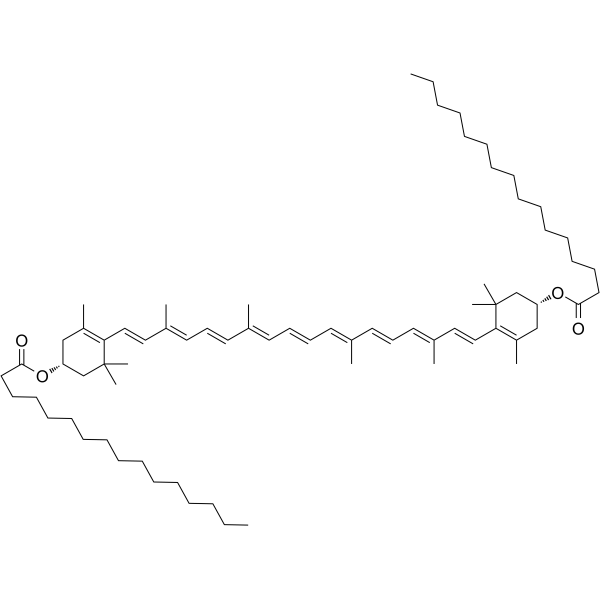144-67-2
| Name | [(1R)-4-[(1E,3E,5E,7E,9E,11E,13E,15E,17E)-18-[(4R)-4-hexadecanoyloxy-2,6,6-trimethylcyclohexen-1-yl]-3,7,12,16-tetramethyloctadeca-1,3,5,7,9,11,13,15,17-nonaenyl]-3,5,5-trimethylcyclohex-3-en-1-yl] hexadecanoate |
|---|---|
| Synonyms |
Physalien
(-)-Di-O-palmitoyl-all-trans-zeaxanthin (3R,3R')-b,b-Carotene-3,3'-diyl Dipalmitate [(1E,3E,5E,7E,9E,11E,13E,15E,17E)-3,7,12,16-Tetramethyl-1,3,5,7,9,11,13,15,17-octadecanonaene-1,18-diyl]bis(1R)-3,5,5-trimethyl-3-cyclohexene-4,1-diyl dihexadecanoate MFCD00198033 physalin [(1E,3E,5E,7E,9E,11E,13E,15E,17E)-3,7,12,16-Tetramethyl-1,3,5,7,9,11,13,15,17-octadecanonaen-1,18-diyl]bis(1R)-3,5,5-trimethyl-3-cyclohexen-4,1-diyldihexadecanoat zeaxanthin dipalmitate zeaxanthin-C16:0,C16:0 EINECS 205-635-9 Hexadecanoic acid, (3R,3'R)-β,β-carotene-3,3'-diyl ester Dihexadécanoate de (3R,3'R)-β,β-carotene-3,3'-diyle Dihexadécanoate de [(1E,3E,5E,7E,9E,11E,13E,15E,17E)-3,7,12,16-tétraméthyl-1,3,5,7,9,11,13,15,17-octadécanonaène-1,18-diyl]bis(1R)-3,5,5-triméthyl-3-cyclohexène-4,1-diyle (3R,3'R)-b,b-Carotene-3,3'-diol Dipalmitate (3R,3'R)-3,3'-Bispalmitoyloxy-b,b-carotene (-)-all-trans-Physalien (3R,3'R)-β,β-Carotin-3,3'-diyldihexadecanoat (3R,3'R)-β,β-Carotene-3,3'-diyl dihexadecanoate (3R,3'R)-zeaxanthin bispalmitate |
| Description | Zeaxanthin dipalmitate (Physalien) is a wolfberry-derived carotenoid, has anti-inflammatory and anti-oxidative stress effects. Zeaxanthin dipalmitate directly interact with p2X7 receptor (Kd=81.2 nM) and adiponectin receptor 1 (AdipoR1; Kd=533 nM) in a positive dose-dependent manner. Zeaxanthin dipalmitate restores mitochondrial autophagy functions suppressed by ethanol intoxication. Zeaxanthin dipalmitate can be used in the research of alcoholic fatty liver disease (AFLD) and retinitis pigmentosa (RP)[1][2]. |
|---|---|
| Related Catalog | |
| Target |
p2X7/AdipoR1 receptor[1] |
| In Vitro | Zeaxanthin dipalmitate (1 µM; 2 h) totally or partially reverses the down-regulation of Atg5, beclin-1, and LC3A/B by ethanol (250 mM), and the up-regulation of p62 by ethanol in BRL-3A cells[1]. Zeaxanthin dipalmitate (1 µM; 2 h) partially recovers the ethanol-suppressed LC3B in BRL-3A cells[1]. Zeaxanthin dipalmitate (1 µM; 2 h) partially recovers the ethanol-suppressed cell viability and ethanol-induced aspase-3/7 activity of BRL-3A cells[1]. Zeaxanthin dipalmitate (1 µM; 2 h) recovers the ethanol-induced inhibition of mitophagy in BRL-3A cells[1]. |
| In Vivo | Zeaxanthin dipalmitate (10 mg/kg; p.o.; daily for 2 weeks) reduces the serum ALT and AST levels increased by long-term ethanol challenge in at AFLD Model[1]. Zeaxanthin dipalmitate (10 mg/kg; p.o.; daily for 2 weeks) effectively attenuates the histological injury[1]. Zeaxanthin dipalmitate (10 mg/kg; p.o.; daily for 2 weeks) attenuates the AFLD-induced hepatic apoptosis (reveal by caspase-3/7 activity) and inflammation (TNF-α) in rat[1]. Zeaxanthin dipalmitate (approximately 4 μM; intravitreal injection for once) improves the visual behavior of rd10 mice and delays the degeneration of retinal photoreceptors[2]. Zeaxanthin dipalmitate (approximately 4 μM; intravitreal injection for once) improves the light responses of photoreceptors, bipolar cells and retinal ganglion cells[2]. Zeaxanthin dipalmitate (approximately 4 μM; intravitreal injection for once) reduces the expression of genes that are involved in inflammation, apoptosis and oxidative stress in rd10 mice[2]. |
| References |
| Density | 1.0±0.1 g/cm3 |
|---|---|
| Boiling Point | 956.4±65.0 °C at 760 mmHg |
| Melting Point | 98-100 °C |
| Molecular Formula | C72H116O4 |
| Molecular Weight | 1045.689 |
| Flash Point | 462.1±32.7 °C |
| Exact Mass | 1044.887329 |
| PSA | 52.60000 |
| LogP | 28.33 |
| Vapour Pressure | 0.0±0.3 mmHg at 25°C |
| Index of Refraction | 1.524 |
